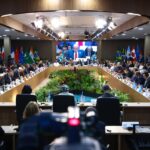**EU Fails to Respond to Repression in Georgia, Says Nathalie Loiseau**
The European Union has been criticized for its slow response to the growing political repression in Georgia. Nathalie Loiseau, a French politician and former EU Commissioner, has urged member states to take national measures to address the situation.
In an interview with Interpressnews, Loiseau expressed her concern about the lack of action from the EU in the face of increasing human rights abuses by the Georgian Dream government. “We are seeing the EU fail to respond to the repression carried out by ‘Georgian Dream‘,” she said. “I urge states to take national measures, some are dragging their feet – We must act more swiftly.”
Loiseau’s comments come at a time when Georgia is facing growing tensions between the ruling party and opposition forces. The Georgian Dream government has been accused of using heavy-handed tactics to suppress dissenting voices, including arrests, beatings, and intimidation.
**A Critical Moment for the EU**
The EU’s response to this crisis will be closely watched by observers in Georgia and beyond. If the bloc fails to take decisive action, it risks appearing weak and ineffective in the face of human rights abuses. This could have serious consequences for the EU’s credibility and reputation as a champion of democracy and human rights.
Loiseau is right to emphasize the need for swift action from member states. The EU has a moral obligation to speak out against repression and support those who are fighting for their rights. By doing so, it can send a clear message that it will not tolerate abuses of power and will stand up for the principles of democracy and human dignity.
**What’s at Stake?**
The consequences of inaction will be severe. If the EU fails to address the growing repression in Georgia, it risks emboldening other authoritarian regimes across Europe and beyond. This could lead to a slippery slope where democratic values are eroded, and human rights abuses become more widespread.
In contrast, if the EU acts decisively, it can send a powerful message that it will not tolerate repression and will stand up for democracy and human rights. This would be a crucial moment for the bloc, as it navigates complex relationships with authoritarian regimes in Eastern Europe and beyond.
As Loiseau urged, “We must act more swiftly.” The EU has a responsibility to act now, before it’s too late.













